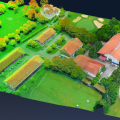In conjunction with the German Aerospace Centre (DLR) and CRC for Spatial Information, RMIT University will be hosting an international summer school in the area of remote sensing technologies. Leading experts from the DLR will deliver the course.
In conjunction with the German Aerospace Centre (DLR) and CRC for Spatial Information, RMIT University will be hosting an international summer school in the area of remote sensing technologies. Leading experts from the DLR will deliver the course over four days.
This workshop is designed for early career industry professionals and students who are currently undertaking or have completed courses in the various areas of geomatics, electronic and computer engineering, physics (optical systems) and other courses that contain digital signal and image processing.
- Receive personal training from and exposure to world leading experts of the DLR.
- Receive folder bound lecture notes.
- Introduction in developing image processing algorithms.
- Photogrammetry.
- GIS products and applications.
- Airborne and space-based remote sensing platform technology.
- Space system engineering.
- Thermal and LiDAR applications for airborne systems.
- Commercial and defence surveillance capabilities.
- Application for fire monitoring and detection from UAV to satellite.
Dates
Monday 11 February 2013 – Thursday 14 February 2013 (four-day course).
Venue
Swanston Academic Building, Level 8, Room 10, 445 Swanston Street, Melbourne.
Presenters
Dr Andreas Eckardt, DLR German Aerospace Centre, Facility Optical Information Systems at the Institute of Robotics and Mechatronics, Dept. Optical Sensorics and Electronics.
Mr Frank Lehmann, DLR German Aerospace Centre, Facility Optical Information Systems at the Institute of Robotics and Mechatronics, Dept. Sensor Concepts and Applications.
Requirements
Participants should have completed at least 3 years of a relevant undergraduate course that has covered the following areas/topics. Digital signal and image processing, systems and sampling theory (2-D), and be familiar with the Fast Fourier and Laplace Transforms.
Contacts details
Dr Peter Moar
Tel. +61 3 9925 1817
Email: peter.moar@rmit.edu.au
Website: www.rmit.edu.au











